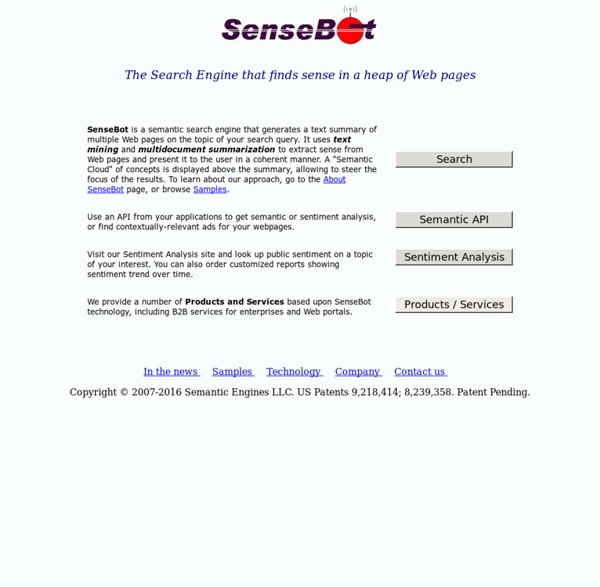



Disco Hyperdata Browser The Disco - Hyperdata Browser is a simple browser for navigating the Semantic Web as an unbound set of data sources. The browser renders all information, that it can find on the Semantic Web about a specific resource, as an HTML page. This resource description contains hyperlinks that allow you to navigate between resources. While you move from resource to resource, the browser dynamically retrieves information by dereferencing HTTP URIs and by following rdfs:seeAlso links. News MobiOne Studio Features Cross-Platform mobile app DEVELOPMENT WYSIWYG Visual UI Designer :: Design Center The Visual UI Designer (Designer) is an easy-to-use drag and drop WYSIWYG editor for interactively laying out and styling user interfaces for mobile apps.
Watson Semantic Web Search This is the Watson Web interface for searching ontologies and semantic documents using keywords. This interface is subject to frequent evolutions and improvements. If you want to share your opinion, suggest improvement or comment on the results, don't hesitate to contact us ... At the moment, you can enter a set of keywords (e.g.
Mobile search Market description[edit] "Competition for the US mobile search market promises to be fierce, thanks to the large US online ad market and strong pushes by portals. By 2011, mobile search will account for around $715 million, or almost 15% of a total mobile advertising market worth nearly $4.7 billion", according to a leading market research firm; eMarketer.[1] Depending on a researcher's particular bias toward telecom, Web or technology factors, the published forecasts for global mobile search vary from $1.5 billion by 2011 (from Informa Telecoms & Media) to over $11 billion by 2008 (according to Piper Jaffray).[2] Mobile search is important for the usability of mobile content for the same reasons as internet search engines became important to the usability of internet content. Early internet content was largely provided by portals such as Netscape.
Metacrawlers and Metasearch Engines Unlike search engines, metacrawlers don't crawl the web themselves to build listings. Instead, they allow searches to be sent to several search engines all at once. The results are then blended together onto one page. Below are some of the major metacrawlers. Also see the Search Toolbars & Utilities page for metacrawler-style software that you can run from your desktop. Einstein for Everyone Einstein for Everyone Nullarbor Press 2007revisions 2008, 2010, 2011, 2012, 2013 Copyright 2007, 2008, 2010, 2011, 2012, 2013 John D. Norton Published by Nullarbor Press, 500 Fifth Avenue, Pittsburgh, Pennsylvania 15260 with offices in Liberty Ave., Pittsburgh, Pennsylvania, 15222
Web 3.0: 13 Semantic Web Apps Web 2.0 was all about getting people to connect with one another and establishing a presence for them on the web. Now that you have gotten the chance to get to know each other through the web, it’s time for our computers to socialize. The aim of the next iteration of the web, Web 3.0, is that computers will be able to understand the content and the information they contain. Rather than the data just being a document, it will be put within context helping the computer to relate pieces of information and present them to you accordingly. Therefore, you will no longer have to sift through a pile of search results, some of which are irrelevant, to get the information you want. While most of the semantic technology is still pretty much underdevelopment and improvement, we at the Thoughpick blog came up with a list to whet your appetite on, in no particular order.
Meta-Search Engines-The Library "Smarter" meta-searcher technology includes clustering and linguistic analysis that attempts to show you themes within results, and some fancy textual analysis and display that can help you dig deeply into a set of results. However, neither of these technologies is any better than the quality of the search engine databases they obtain results from. Few meta-searchers allow you to delve into the largest, most useful search engine databases. They tend to return results from smaller and/or free search engines and miscellaneous free directories, often small and highly commercial. Although we respect the potential of textual analysis and clustering technologies, we recommend directly searching individual search engines to get the most precise results, and using meta-searchers if you want to explore more broadly.
Clustering Engine Carrot2 Search Results Clustering Engine Carrot2 organizes your search results into topics. With an instant overview of what's available, you will quickly find what you're looking for. Choose where to search: Type your query: List of People search engines This is a list of articles about search engines, including web search engines, selection-based search engines, metasearch engines, desktop search tools, and web portals and vertical market websites that have a search facility for online databases. By content/topic General P2P search engines
Guide to flirting Why do we flirt? Flirting is much more than just a bit of fun: it is a universal and essential aspect of human interaction. Anthropological research shows that flirting is to be found, in some form, in all cultures and societies around the world. Flirting is a basic instinct, part of human nature. This is not surprising: if we did not initiate contact and express interest in members of the opposite sex, we would not progress to reproduction, and the human species would become extinct. According to some evolutionary psychologists, flirting may even be the foundation of civilisation as we know it.
100 Useful Tips and Tools to Research the Deep Web By Alisa Miller Experts say that typical search engines like Yahoo! and Google only pick up about 1% of the information available on the Internet. The rest of that information is considered to be hidden in the deep web, also referred to as the invisible web. So how can you find all the rest of this information? A Generation Lost in the Bazaar The Bike Shed Development Poul-Henning Kamp The Invisible Web What is the Invisible Web? How can you find it online? What makes the Invisible Web search engines and Invisible Web databases so special?